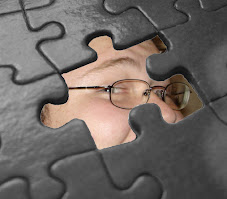
Remember when I said I was in the "Smarty Pants Book Club"? Well, tonight I'm feeling a little smarty pants. Tonight my book club discussed that book to the left. Apparently, the author, Dr Glasser, is convinced that Freudian psychoanalytic procedures are ineffective and developed his own approach. He takes a much more action-oriented look at things. Rather than look at what happened to you in your past, he wants you to look at how things are going for you now. He also uses terminology that sets people (or their actions) in two categories: responsible and irresponsible. He says that each person has just a few basic needs: to love and be loved, and to feel worthwhile to others as well as himself or herself. Whether you are completely delusional and think you are a duck, or if you are just prone to depression, the common cause is an inability to meet these needs.
Now, I liked the principle behind the book. I’m all for taking responsibility for your actions and moving on with life. No one gets anywhere if we all sit in our rooms and sulk, wondering who is to blame for the problems in our lives. Even if you know who is to blame, it’s not making your life better. But while the principle works for the average Joe, I’m not sure that learning correct behavior or teaching responsibility to a schizophrenic person will cure them.
Another disagreement I had with the book is that I don’t think that completely ignoring your past is the best way to move on. Here’s a paragraph from the book:
“It is not only possible, it is desirable [for a person] to ignore his past and work in the present because, contrary to almost universal belief, nothing which happens in his past, no matter how it may have affected him then or now, will make any difference once he learns to fulfill his needs at the present time.”
I agree there’s no need to dwell on the past. But what if fulfilling your present needs includes a correct understanding of your past? How can you move on in a healthy state of mind if you think the physical abuse you endured as a child was your fault? If you think that the discord in your family life is your fault, because a verbally abusive parent told you so? I don’t think it is always necessary to confront an abuser or otherwise guilty party and speak your peace, but I do think that it is often necessary to realize that horrible experiences, like abuse, weren’t the victim’s fault in order for the victim to move on and have a normal life with normal relationships.
I do however, agree with the following statement from the book:
“If we do not evaluate our own behavior, or having evaluated it, we do not act to improve our conduct where it is below our standards, we will not fulfill our need to be worthwhile and we will suffer as acutely as when we fail to love or be loved. Morals, standards, values, or right and wrong behavior are intimately related to the fulfillment of our need for self worth and… a necessary part of Reality Therapy.”
So what do you think? Can most psychoses and bad or irregular behavior be explained by past experiences that must be reviewed and scrutinized to fully understand how to move on, or can most psychoses and bad or irregular behavior be countered and fixed by teaching and learning responsible behavior, while correcting irresponsible behavior? I’ll be honest, I haven’t quite finished the book, but I plan to. So what’s your take?





































